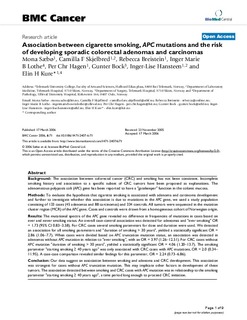Association between cigarette smoking, APC mutations and the risk of developing sporadic colorectal adenomas and carcinomas
Sæbø, Mona; Skjelbred, Camilla Furu; Breistein, Rebecca; Lothe, Inger Marie Bowitz; Hagen, Per Chr.; Bock, Günther; Hansteen, Inger-Lise; Kure, Elin H.
Journal article, Peer reviewed
Published version
Permanent lenke
http://hdl.handle.net/11250/2439251Utgivelsesdato
2006-03-17Metadata
Vis full innførselSamlinger
Sammendrag
BACKGROUND: The association between colorectal cancer (CRC) and smoking has not been consistent. Incomplete smoking history and association to a specific subset of CRC tumors have been proposed as explanations. The adenomatous polyposis coli (APC) gene has been reported to have a "gatekeeper" function in the colonic mucosa. METHODS: To evaluate the hypothesis that cigarette smoking is associated with adenoma and carcinoma development and further to investigate whether this association is due to mutations in the APC gene, we used a study population consisting of 133 cases (45 adenomas and 88 carcinomas) and 334 controls. All tumors were sequenced in the mutation cluster region (MCR) of the APC gene. Cases and controls were drawn from a homogeneous cohort of Norwegian origin. RESULTS: The mutational spectra of the APC gene revealed no difference in frequencies of mutations in cases based on ever and never smoking status. An overall case-control association was detected for adenomas and "ever smoking" OR = 1.73 (95% CI 0.83-3.58). For CRC cases several smoking parameters for dose and duration were used. We detected an association for all smoking parameters and "duration of smoking > 30 years", yielded a statistically significant OR = 2.86 (1.06-7.7). When cases were divided based on APC truncation mutation status, an association was detected in adenomas without APC mutation in relation to "ever smoking", with an OR = 3.97 (1.26-12.51). For CRC cases without APC mutation "duration of smoking > 30 years", yielded a statistically significant OR = 4.06 (1.20-13.7). The smoking parameter "starting smoking > or = 40 years ago" was only associated with CRC cases with APC mutations, OR = 2.0 (0.34-11.95). A case-case comparison revealed similar findings for this parameter, OR = 2.24 (0.73-6.86). CONCLUSION: Our data suggest an association between smoking and adenoma and CRC development. This association was strongest for cases without APC truncation mutation. This may implicate other factors in development of these tumors. The association detected between smoking and CRC cases with APC mutation was in relationship to the smoking parameter "starting smoking > or = 40 years ago", a time period long enough to proceed CRC initiation. Denne delstudien har en case-control design med inkludering av personer med cancer, adenomer og kontrollpersoner som ikke fikk påvist neoplasi ved screening. Hensikten var å se om mutasjoner i APC-genet kan bety noe for en eventuell sammenheng mellom røyking og kolorektale neoplasier. I forhold til cancer var det bare "røyking >40 år" som var assosiert med APC mutasjoner i den såkalte "mutation cluster region" (MCR) hvor 60-70% av de somatiske mutasjonen i APC foregår. Materialet støtter også tidligere funn om en generell assosiasjon mellom røyking og forekomst av adenomer, men at denne assosiasjonen er sterkest hvor det ikke foreligger MCR mutasjoner i APC-genet. Dette kan tyde på at det er andre faktorer enn MCR-mutasjoner i APC som er av betydning ved utvikling av adenomer.
